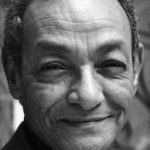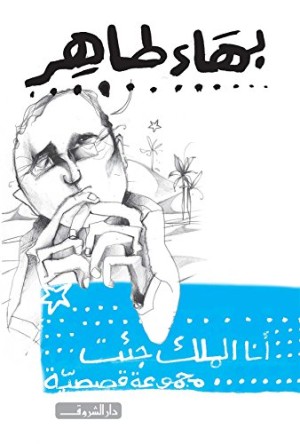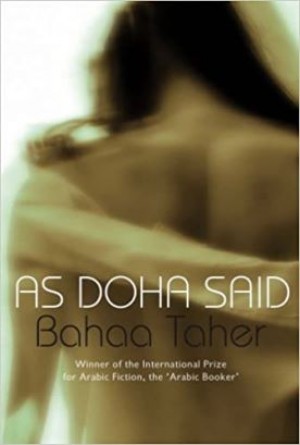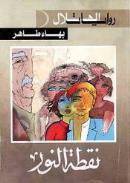Bahaa Taher 1935 - 2022 .
We were honored to have him as a member of our board of trustees in arabworldbooks.com since 2004 until he passed away in October 2022.
Bahaa Tahir also writtern Baha Taher, or Baha Tahir was born on 13 January 1935 in Cairo, Egypt. He earned a bachelor's degree in history, Faculty of Arts in 1956, then a postgraduate diploma in media from the University of Cairo in 1973. Shortly after graduating from the University of Cairo, he began his career as a translator for the government and helped to launch Radio Cairo’s cultural program in 1957, producing radio dramas. In 1964, he published his first short story. Bahaa was active in the left-wing and avant-garde literary circles of the 1960s and was one of the writers of the Gallery 68 movement. A storyteller and social commentator Taher lost his job in radio broadcasting and was prevented from publishing in the mid 1970s in Sadat's Egypt.
In 1981 he chose to leave for Geneva to work as a translator for the United Nations. After many years of exile in Switzerland 1981 to 1995, he returned to Egypt. Egypt lifted the ban on his work in 1983, allowing the works he produced in Geneva to see the light - Al Hob fil Manfa (Love in Exile) - which tackles exile, disillusionment, and the redemptive power of love; and Qalat Duha (As Doha Said), exploring the hopes and disappointments of the early Nasserist era, among others.
His collected works were published in Cairo by Dar al Hilal in 1992, and a film was made about him as a leading member of the 60s generation by Jamil 'At iyyat lbrahim ( Gamil Ateya Ibrahim ) in 1995.
Quickly becoming one of the most widely read contemporary novelists in the Arab world, Taher has received in 1998 the State's Award of Merit in Literature, the highest honour the Egyptian establishment can confer on a writer.
In 2000 he was awarded the prestigious Italian Guiseppe Acerbi prize for his widely acclaimed novel Khalti Safiya wal Dier (My Aunt Safiya and the Monastery)
Over his career, Taher published 17 books, including Sunset Oasis, which won the inaugural International Prize for Arabic Fiction in 2008, and several plays.
A selection of his works are :
Several Collections of Short Stories
al-Khutuba (The Engagement) (Cairo; G.E. B. 0., 1972. Series; Matbu'at al-Jadid, 7) (Cairo; Dar Shahdi li-l-Nashr, 1984)
His first collection of stories, Al Khotouba (The Engagement) had invoked, according to Sabri Hafez, "an extremely strange, nightmarish world, which is nevertheless presented in very ordinary language, as if its strangeness were neither surprising nor lamentable".
Bi-l-Amsi Halamtu Bi-K (Cairo; G.E. B. 0., 1984. Series; Mukhtarat Fusul ,4)
Ana al-Malik Ji'tu (Cairo; G.E. B. 0., 1985. Series; Mukhtarat Fusul , 19)
Zahabtu ila Shallal (I Went to a Waterfall),
First book to be written after his return to Egypt from an extended stay in the West.
The stories in Zahabtu ila Shallal are far from being complacent variations on favourite themes. For Taher they comprise the effort to come to grips with the changes wrought on the social and political landscape during 14 years of "self-imposed exile", as he puts it
Novels
Sharq al-Nakhila ( East of Palms) (Cairo: Dar al-Mustaqbal al-'Arabi, 1985) Originally serialized in Sabah al-Khayr in 1983.
Qalat Duha ( Doha Said ) (Cairo: Dar al-Hilal, 1985) Originally serialized in al-Musawwir in 1985.
Khalati Safiyya wal-Dayr ( Aunt Safeyya and the Monastery) (Cairo: Dar al-Hilal, 1991)
Village life in Upper Egypt is magically evoked in this compelling novel of a traditional society caught up in the process of change. The peaceful coexistence of Muslims and Christians is threatened when a young Muslim is given sanctuary in a Christian monastery. He has killed a man in self defense and the widow is calling for vengeance.
Al-Hob fi al-Manfa (Love in Exile) 1995
widely acclaimed novel, described by I'tidal Osman as "an expansive vision that encompasses world and homeland, north and south, self and other"
The point of light (1999)
Sunset Oasis 2007
His sixth novel is set in 19th century Egypt at the beginning of the British occupation of the country. The protagonist of the book is a nationalist Egyptian police officer who suffers from an existential crisis. He is posted to the desert oasis of Siwa by his British superiors, for his involvement in the failed Urabi revolt of 1882.
Other Works related to Egyptian Culture
Masrahiyyat Misriyya: 'Ard wa-Naqd
Analysis of 10 Egyptian plays (Cairo: Dar al-Hilal, 1985)
Translations
Aunt Safiyya and the Monastery has been translated into ten languages, including the 1996 English translation by Barbara Romaine.
His short story Suddenly it Rained was included in Egyptian Short Stories selected and translated by Denys Johnson-Davies (Washington D.C.: Three Continents Press, 1978)
His short story Advice from a Sensible Young Man was included in Arabic Short Stories selected and translated by Denys Johnson-Davies (London, Melbourne and New York: Quartet, 1983)
His short story Bil-Ams Halamtu Bi-K, was included in Egyptian Tales and Short Stories of the 1970s and 1980s; edited by W. M. Hutchins (Cairo: American University in Cairo Press, 1987)
Love in Exile was translated into English by Farouk Abdel Wahab, the pen name of Farouk Mustafa. The translation was published by American University in Cairo Press in 2001 and later reissued by Arabia Books.
Qalat Doha (As Doha Said) was translated by Peter Daniel and published by the American University in Cairo Press in 2008.
Sunset Oasis was translated into English by Humphrey Davies and was published in the UK in 2009 by Sceptre.
Sunset Oasis was translated into Norwegian by Unn Gyda Næss and is published by Vigmostad og Bjørke. Norwegian title: "Der solen går ned", ISBN 978-82-419-05
Awards
1998 State Award of Merit in Literature, which is Egypt’s highest literary award.
2000 Italian Giuseppe Acerbi Prize for Aunt Safiyya and the Monastery.
2008 International Prize for Arabic Fiction for Sunset Oasis. He is the first winner of this prize.
We thank Ms. Elizabeth Kendall for her research on the Gallery 68 movement and Mr. Youssef Rakha for his cultural articles in Al-Ahram weekly which are the source of some of this information








